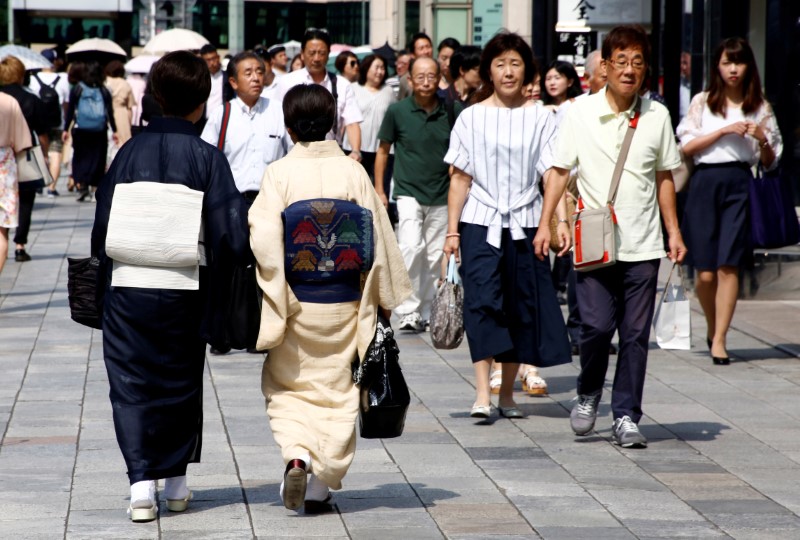 © Reuters. FILE PHOTO: Women in traditional costume ‘Kimono’ make their way at a shopping district in Tokyo
© Reuters. FILE PHOTO: Women in traditional costume ‘Kimono’ make their way at a shopping district in TokyoBy Leika Kihara
TOKYO (Reuters) – The percentage of Japanese households expecting inflation to accelerate has hit a nearly two-year high, a central bank survey showed, offering some hope that economic recovery will help the Bank of Japan meet its elusive 2 percent price target.
But more households complained they were worse off than a year ago as rising prices forced them to boost spending, the survey found, underscoring the challenge policymakers face in driving up inflation without denting consumption.
“For the ordinary household, price hikes continue to be something that’s undesirable,” said a BOJ official who briefed reporters on Thursday on the quarterly survey, conducted between Nov. 10 and Dec. 6.
The BOJ’s survey on people’s livelihood showed the percentage of households who expect prices to rise a year from now was 75.6 percent in December, up from 70.4 percent in September and the highest level since March 2016.
Among the surveyed households, 81.9 percent said they expect inflation to pick up five years from now, up slightly from 81.4 percent in September.
Slightly more than two-thirds – 67.1 percent – felt prices rose from one year, up from 63.2 percent in September, a sign households were feeling the pinch from higher energy and grocery prices.
A separate index measuring households’ livelihood worsened to minus 33.7 in December from minus 31.9 percent in September, indicating that more respondents felt they were worse off compared with one year earlier.
The ratio of households who saw spending rise from a year ago stood at 41.5 percent, up from 38.5 percent in September, with many of the respondents citing higher costs of living, the survey showed.
Japan’s economy grew an annualized 2.5 percent in July-September to mark a seventh straight quarter of growth, thanks to robust exports and capital expenditure.
But core consumer prices rose 0.9 percent in November from a year earlier, still distant from the BOJ’s target as firms remain wary of scaring away cost-sensitive consumers with price hikes.
The survey is among the key data the BOJ scrutinizes in assessing the impact of its ultra-easy monetary policy.
The BOJ kept monetary policy steady last month and its governor reassured markets the central bank will lag well behind overseas peers in ending crisis-mode easing.
Fusion Media or anyone involved with Fusion Media will not accept any liability for loss or damage as a result of reliance on the information including data, quotes, charts and buy/sell signals contained within this website. Please be fully informed regarding the risks and costs associated with trading the financial markets, it is one of the riskiest investment forms possible.
Source: Investing.com


























